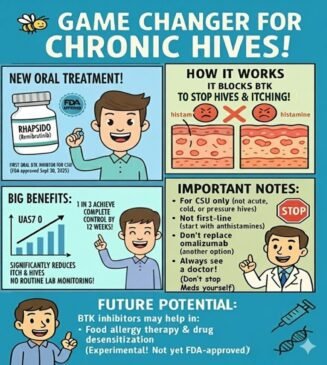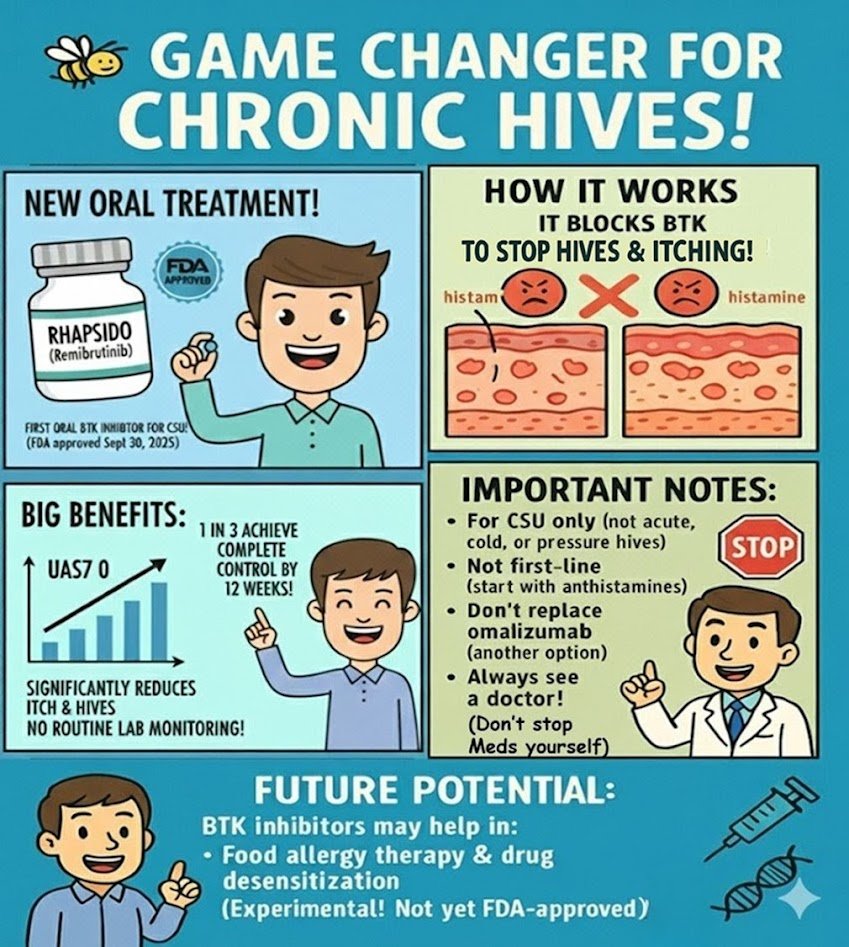For years, patients with chronic spontaneous urticaria (CSU) who didn’t respond to antihistamines had only injections as the next step. On September 30, 2025, the U.S. Food and Drug Administration (FDA) approved remibrutinib (brand name Rhapsido), the first oral BTK inhibitor for adults with CSU. This approval offers patients — and doctors — the first convenient oral option beyond antihistamines. What Is Chronic Spontaneous Urticaria (CSU)? Why an Oral Option Matters Until now, patients had only these alternatives: Patients have long asked for a safe oral treatment that avoids injections…
Read MoreDrug vs Food Allergy: Immediate & Delayed Reactions
Drug vs Food Allergy: Why Medications Can Cause Both Immediate and Delayed Reactions — While Foods Uncommonly Cause Severe Delayed Reactions This article is for educational purposes only. Always consult healthcare providers for personalized medical advice. Patients often ask:“Why can medications cause both rapid allergic reactions like hives or anaphylaxis and dangerous delayed reactions such as Stevens–Johnson Syndrome (SJS) or Drug Reaction with Eosinophilia and Systemic Symptoms (DRESS), while food allergies almost always appear immediately?” The difference lies in how the immune system processes drugs versus foods — and in…
Read MoreSulfa Allergy: Safe Drugs, Drugs to Avoid, and How to Think About Cross-Reactivity
Many patients search online for sulfa allergy safe drugs after experiencing severe reactions to antibiotics such as co-trimoxazole (trimethoprim-sulfamethoxazole). When people hear the term “sulfa allergy,” confusion often follows. Some patients wonder if they must avoid every drug with “sulfa” in the name. The truth is: not all sulfa-containing medications are dangerous. The key is understanding the chemical structure—specifically whether the drug contains the N4 arylamine group. The Real Culprit: The N4 Arylamine Group The allergy risk in sulfonamide antibiotics comes from a specific chemical feature known as the N4…
Read MoreROAT Patch Testing in SCARs: Is It Time to Reconsider?
Introduction Severe cutaneous adverse reactions (SCARs) — such as DRESS, AGEP, and SJS/TEN — are among the most serious drug hypersensitivity syndromes.The traditional approach is simple: avoid all suspected drugs indefinitely. But this blanket avoidance often creates real-world problems: This raises an important question:👉 Is it time to reconsider the role of patch testing — and even the Repeated Open Application Test (ROAT) — in managing SCARs? Why ROAT Is Feared in SCARs The Repeated Open Application Test (ROAT) is a simple diagnostic tool in delayed hypersensitivity: Concerns in SCARs:…
Read MoreFDA Warns of Severe Rebound Itching After Stopping Cetirizine (Zyrtec) or Levocetirizine (Xyzal): What You Need to Know
🛑 New FDA Safety Alert: Antihistamine Withdrawal Can Trigger Severe Itching In May 2025, the U.S. Food and Drug Administration (FDA) issued a new safety warning about rebound itching after stopping cetirizine (Zyrtec) or levocetirizine (Xyzal)—two of the most commonly used antihistamines. This severe itching reaction, often mistaken for allergy relapse, may occur especially in people who have taken the drug daily for several months. 🔎 Key Findings from the FDA Investigation Between April 2017 and July 2023, the FDA identified 209 confirmed cases globally—197 in the U.S.—involving moderate to…
Read MoreSebetralstat: The First Oral Treatment for HAE Approved by FDA
Oral HAE treatment is now FDA-approved. On July 7, 2025, Sebetralstat (Ekterly®) became the first oral on-demand therapy for acute attacks in hereditary angioedema (HAE), marking a major shift in how this rare condition is managed. Hereditary Angioedema (HAE) is a rare genetic disorder that causes unpredictable, recurrent episodes of swelling, often affecting the face, throat, gastrointestinal tract, and extremities. If untreated, these attacks can be life-threatening. Until recently, on-demand treatment for HAE required injections only. While berotralstat (Orladeyo®) became the first oral medication approved for prophylaxis in 2020, acute…
Read MoreThe Basophil Activation Test (BAT): A Game-Changing Tool for Food Allergy Diagnosis
Diagnosing food allergies accurately remains one of the biggest challenges in allergy medicine. Traditional approaches like skin prick tests (SPT) and specific IgE blood tests can tell us if someone is sensitized to a food, but they don’t always predict whether that person will actually have an allergic reaction. Meanwhile, oral food challenges (OFCs)—the gold standard—are time-consuming, expensive, and carry real risks of severe reactions. Enter the Basophil Activation Test (BAT): a revolutionary diagnostic tool that’s changing how we approach food allergy diagnosis. 🧪 What Makes BAT Different? BAT is…
Read MoreBeyond the Surface: Rethinking Rechallenge in Suspected Drug-Induced SSLR and Serum Sickness
IntroductionDrug-induced serum sickness-like reactions (SSLR) are a complex and often confusing condition for both patients and healthcare providers. These reactions, usually triggered by medications like beta-lactam antibiotics, can cause rash, fever, and joint pain. While SSLRs are generally thought to be milder than true serum sickness, which is caused by immune complexes circulating in the blood, the two conditions can look very similar. The real challenge? In most cases, we rely on patient history alone to make the distinction, and that can be dangerously misleading. The Diagnostic Dilemma: SSLR vs.…
Read MoreWhen and How to Perform Drug Provocation Tests in Drug Hypersensitivity: Timing Matters
Introduction Drug provocation test timing plays a critical role in evaluating suspected drug allergies. Drug provocation testing (DPT), also known as a drug challenge, remains the gold standard for confirming or ruling out drug hypersensitivity. However, success depends heavily on understanding how soon after drug exposure symptoms appear. By tailoring the timing and protocol of DPT based on the type of reaction—immediate, delayed, or severe—clinicians can improve diagnostic accuracy and minimize risk. This post outlines practical strategies, guideline updates, and real-world challenges that affect how and when drug provocation tests…
Read MoreRethinking Drug Allergy Management: Finding Balance Between Caution and Access in SCARs
Drug allergies present a complex landscape, demanding tailored management strategies based on the reaction’s nature and severity. We’ve witnessed significant progress in “de-labeling” allergies to common drugs like penicillin through careful testing, allowing many to safely access essential treatments. However, the approach to severe cutaneous adverse reactions (SCARs) – encompassing Stevens-Johnson Syndrome (SJS), Toxic Epidermal Necrolysis (TEN), Drug Reaction with Eosinophilia and Systemic Symptoms (DRESS), and Acute Generalized Exanthematous Pustulosis (AGEP) – often stands in stark contrast: a broad and often indefinite avoidance of all potentially implicated drugs. While the…
Read More


















